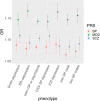Genetic and clinical characteristics of treatment-resistant depression using primary care records in two UK cohorts
- PMID: 33753889
- PMCID: PMC8505242
- DOI: 10.1038/s41380-021-01062-9
Genetic and clinical characteristics of treatment-resistant depression using primary care records in two UK cohorts
Abstract
Treatment-resistant depression (TRD) is a major contributor to the disability caused by major depressive disorder (MDD). Primary care electronic health records provide an easily accessible approach to investigate TRD clinical and genetic characteristics. MDD defined from primary care records in UK Biobank (UKB) and EXCEED studies was compared with other measures of depression and tested for association with MDD polygenic risk score (PRS). Using prescribing records, TRD was defined from at least two switches between antidepressant drugs, each prescribed for at least 6 weeks. Clinical-demographic characteristics, SNP-based heritability (h2SNP) and genetic overlap with psychiatric and non-psychiatric traits were compared in TRD and non-TRD MDD cases. In 230,096 and 8926 UKB and EXCEED participants with primary care data, respectively, the prevalence of MDD was 8.7% and 14.2%, of which 13.2% and 13.5% was TRD, respectively. In both cohorts, MDD defined from primary care records was strongly associated with MDD PRS, and in UKB it showed overlap of 71-88% with other MDD definitions. In UKB, TRD vs healthy controls and non-TRD vs healthy controls h2SNP was comparable (0.25 [SE = 0.04] and 0.19 [SE = 0.02], respectively). TRD vs non-TRD was positively associated with the PRS of attention deficit hyperactivity disorder, with lower socio-economic status, obesity, higher neuroticism and other unfavourable clinical characteristics. This study demonstrated that MDD and TRD can be reliably defined using primary care records and provides the first large scale population assessment of the genetic, clinical and demographic characteristics of TRD.
© 2021. The Author(s).
Conflict of interest statement
CML is a member of the Scientific Advisory Board of Myriad Neurosciences. AS is or has been consultant/speaker for: Abbott, Abbvie, Angelini, Astra Zeneca, Clinical Data, Boheringer, Bristol Myers Squibb, Eli Lilly, GlaxoSmithKline, Innovapharma, Italfarmaco, Janssen, Lundbeck, Naurex, Pfizer, Polifarma, Sanofi, Servier. The other authors declare no potential conflict of interest.
Figures





References
-
- GBD 2015 Disease and Injury Incidence and Prevalence Collaborators. Global, regional, and national incidence, prevalence, and years lived with disability for 310 diseases and injuries, 1990-2015: a systematic analysis for the Global Burden of Disease Study 2015. Lancet Lond Engl. 2016;388:1545–602. doi: 10.1016/S0140-6736(16)31678-6. - DOI - PMC - PubMed
-
- Cipriani A, Furukawa TA, Salanti G, Chaimani A, Atkinson LZ, Ogawa Y, et al. Comparative efficacy and acceptability of 21 antidepressant drugs for the acute treatment of adults with major depressive disorder: a systematic review and network meta-analysis. Lancet Lond Engl. 2018;391:1357–66. doi: 10.1016/S0140-6736(17)32802-7. - DOI - PMC - PubMed
-
- Ferenchick EK, Ramanuj P, Pincus HA. Depression in primary care: part 1—screening and diagnosis. BMJ. 2019;365:l794. - PubMed
Publication types
MeSH terms
Grants and funding
LinkOut - more resources
Full Text Sources
Other Literature Sources

